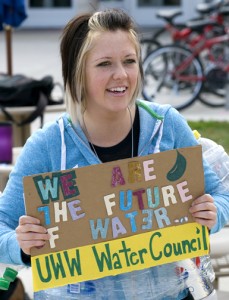Business students and faculty members are immersing themselves in water activities as the UW-Whitewater College of Business and Economics expands its focus on the business of water.
As Milwaukee positions itself as a world water hub, UW-Whitewater is providing innovative and creative contributions to the growing regional cluster of freshwater businesses. From the new water business minor to the combined science-business degree with a water emphasis, the university is educating the future water workforce.
Students are busy with internships in water programs here and abroad, and partnerships are thriving between the university and community members.
“We’re doing this because it matters,’’ said Meghan Jensen, a graduate student in marketing and management and founder of the student Water Council. “It’s students saying, ‘Hey, this is an issue that’s important.’ We’re making a huge step in the water business.”
Andrew Smits ’10, UW-Whitewater’s first water graduate in the business-science major, landed his dream job with Ecolab, a global company with headquarters in St. Paul, Minn.

Meghan Jensen, a graduate student and president of the UW-Whitewater Water Council, wore water bottles and carried a sign to promote water awareness on campus.
He’s an account manager for a region of northeastern Wisconsin and Michigan’s Upper Peninsula, visiting large dairy plants and other users of his company’s water treatment products. He loves his job and thinks UW-Whitewater prepared him well.
“I never thought I would do a chemical titration ever again after my chemistry classes,” Smits said. “Now I carry a chemical set and do all sorts of titrations.”
Recent business water news includes:
Economic development. A grant of $970,000 to foster innovation and create jobs was awarded to a collaborative effort that includes UW-Whitewater. The five-year grant came from the U.S. Economic Development Administration under its University Center Program. Water and energy are expected to be a priority for the project, which also includes the Milwaukee School of Engineering, Marquette University, UW-Parkside and UW-Milwaukee.
Institute of Water Business. A proposal is being developed to create a campus program that would embrace water business efforts, facilitate outreach and community activities and provide advising and career counseling for water business students. It could offer continuing education opportunities on such issues as environmental accounting and water law and policy, promote awareness of water issues and work with other successful centers on campus, including the Global Business Resource Center and the Fiscal and Economic Research Center.
It also could foster collaboration with entrepreneurial activities at the Innovation Center at Whitewater University Technology Park.
International interns. Three MBA students spent a summer in Singapore working as interns with the Singapore-Delft Water Alliance at the National University of Singapore. One of them, Jensen, helped create the urban sustainability display for Singapore International Water Week and participated in the opening of the Aquatic Science Centre, meeting with researchers to plan posters, websites and Facebook materials.
“It made me realize that Milwaukee is definitely on its way to becoming a world water hub,” Jensen said. “That experience helped prepare me to see a broader sense of the water industry and compare it to what we’re doing in Milwaukee. UW-Whitewater definitely fits in.”
She’s also a global communications intern at Badger Meter, the Milwaukee company headed by UW-Whitewater business alumnus Richard Meeusen, whose vision helped inspire the university to create its water business programs.
Educational excellence. When a Milwaukee nonprofit group was looking for meaningful examples of hands-on student learning, it turned to UW-Whitewater and its water programs. Representatives of the Great Lakes Constructivist Consortium, which advocates learner-centered education, made a video that included students collecting water samples from Whitewater Creek and cleaning up Lake Michigan beaches.
UW-Whitewater Water Council. Founded just two years ago, the student organization is thriving. UW-Whitewater students toured Sweet Water Organics, an urban vegetable and fish farm in Milwaukee, and visited the School of Freshwater Sciences at UW-Milwaukee. They also volunteered as Milwaukee hosted the fifth annual Water Summit, which draws hundreds of people focused on the energy, economic and environmental issues of water.
Rock River Basin. UW-Whitewater is working with UW-Extension and municipalities within the 10 counties of the Rock River Basin to be chosen for the IBM Smarter Cities Challenge. The competitive grant program provides $50 million in IBM expertise to help communities explore challenges that affect the lives of citizens.
World water issues. Last summer’s travel study trip to Ireland filled up quickly with UW-Whitewater students eager to explore issues of sustainability and water. They’ll attend a lecture by Owen McIntyre, an expert on international water law at University College in Cork, and visit the IBM Water Management Centre of Excellence in Dublin.
Community survey. New automated water meters in the city of Whitewater provide timely data on water consumption with updates every six hours. This allows quick detection of leaks and helps residents better understand how much water they’re using.
Campus sustainability. UW-Whitewater installed water bottle filling stations to encourage use of reusable containers and offer access to filtered drinking water. Stations have opened in the Williams Center, the James R. Connor University Center, Hyer Hall and several residence halls. Dual-flush toilets that conserve water have been installed in Timothy J. Hyland Hall, home of the College of Business and Economics.
